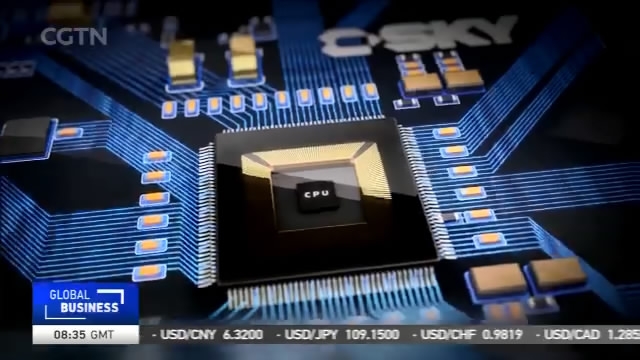
19:13, 25-Apr-2018
Chinese-Made Semiconductors: Trade tensions encourage domestic tech firms to invest in chips
03:10

China has long been pushing the development of high-end semiconductors, and the current trade tensions with the US has made the government more determined to reach that goal. At the same time, big tech firms around the world are doubling down on their investments in the chip-making industry. Will this be the start of a boom for the business? Mi Jiayi has more.
The news that Shenzhen-based ZTE is facing a seven-year ban on purchases of chips from American companies has many Chinese tech firms worried, because many are as highly reliant on imported chips as ZTE is. Developing a microchip industry is far from easy, however, according to Shen Chongfei, CEO of an infrared thermal imaging company in Shanghai. It took his company ten years to do it, starting from scratch.
SHEN CHONGFEI, CEO MAGNITY ELECTRONICS "In the past, all our chips for thermal imaging products were imported. But they put a lot of restrictions on them, such as the products could not be sold for military use. Also, you couldn't buy top-end chips from them.
Shen says his biggest problem was finding talent. And there was no complete industry environment to support the research. Now, however, they've worked out their problems and manufacture their own chips for their own products. While the smaller firms are working hard to develop their own chips, big names in the tech business are investing heavily in chip makers. The latest is Alibaba, which last week bought a Hangzhou-based integrated circuit design company in a bid to boost its Internet of Thing business. Baidu and Tencent had previously also invested in several semi-conductor companies. Why should the internet companies see microchips as a growth market?
SHEN CHONGFEI, CEO MAGNITY ELECTRONICS "In general, what companies need are specialized chips, and we wanted to lower the costs of the chips we use. You can't buy these chips any cheaper in the market, so we had to develop our own. Some companies in our industry want to use high-performance chips so they can sell to the military, so they are developing those chips at any cost. So you see, companies want different things, and these can't just simply be bought in the general market. So they have to develop their own."
While the trade tensions between China and US may threaten the stability of imports, some argue this could be a good thing for the development of China's own integrated circuit industry.
CHEN JIAHE, CHIEF ANALYST CINDA SECURITIES "US says we are going to block China from importing all our equipment, then that would be a good opportunity, because the entire Chinese market will be no longer importing high-quality US products, and domestic companies will have a very large market left by the US."
China has made chip development one of the key goals of its Made in China 2025 strategy. There is a national fund to support tech firms working in the sector, and as of 2017, the fund had put 118.8 billion yuan into 67 projects.

SITEMAP
Copyright © 2018 CGTN. Beijing ICP prepared NO.16065310-3
Copyright © 2018 CGTN. Beijing ICP prepared NO.16065310-3